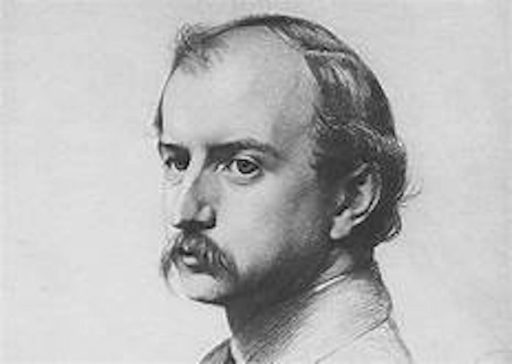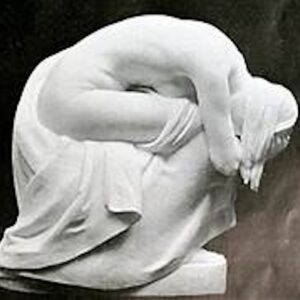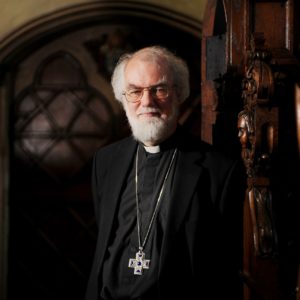This is my third time through a book I’ve admired since I first read it during my twenties and then reread it, with equal admiration, in my forties: Henry Adams’s The Education of Henry Adams (1905). And now, near eighty, I’m reading and admiring it again.
Why? Didn’t I get enough of Adams’s fondness for paradox the first time?
Well, no, I never get enough of well-framed paradoxes, and Adams is a master of such constructions.
But if my picking the old, worn Modern Library copy off our shelves was motivated mostly by the nostalgic hope of revisiting for a moment or two a former pleasure, the fact that I kept reading had another end: to puzzle over the comments, questions, explications, and exclamations filling the book’s margins from beginning to end.
One set, of the twenty-something year-old me, was done with a red felt tipped pen. This reader (aka “me”) charges boldly and enthusiastically through the book, crying “Great!” and “Wonderful!” when a paradox hits home. And often pausing, in best graduate-student fashion, to explain exactly how home was hit. (A lecture-hall full of rapt students take rapid notes. One shoots up a hand: “Will it be on the exam?”).
The forty-year-old me has exchanged a red felt tip pen for a less flashy ball pointer. But the forty-year-old still has some pep, and clearly enjoys correcting his younger self from time to time, or pointing out a clever phrase or ironic metaphor his younger counterpart missed or insufficiently clarified.
Here, for example, is an Adams paragraph that drew out the best in me (or my “me’s”):
At ten o’clock of a July night, in heat that made the tropical rain-shower simmer, the Adams family and the Motley family clambered down the side of the Cunard steamer into the government tugboat, which set them ashore in black darkness at some North River pier. Had they been Tyrian traders of the year b.c. 1000, landing from a galley fresh from Gibraltar, they could hardly have been stranger on the shore of a world, so changed from what it had been ten years before. The historian of the Dutch, no longer historian but diplomatist, started up an unknown street, in company with the private secretary who had become private citizen, in search of carriages to convey the two parties to the Brevoort House. The pursuit was arduous but successful. Towards midnight they found shelter once more in their native land.
(Some context here: the year is 1868. Henry Adams is returning to the U.S. for the first time since 1861, when he left to accompany his father, Lincoln’s newly appointed ambassador to Great Britain. “Motley” is John Lothrop Motley, best known for his Rise of the Dutch Republic.)
The red pen densely frames this paragraph: on the top, then down the right side. On the top:
The opening para.— an “adventure” sentence introduces things, but then the Adams family appears in it.
Starting down the side:
An opening out of Conrad…two kinds of stranger here: first a conspirator (indicated by vocabulary), then a man from the past.
The ballpoint pen fills in just once, by underlining “native land,” then commenting:
which has been talked about as if it were another world.
Good job, guys! You’ve alertly noticed the ways Adams has shifted his diction to emphasize his feeling of dislocation in time. I can sum up your point here in words you’d have thought redundant to write down: “He” (Adams refers to himself throughout in the third person) returns in 1868 to a US he can no longer recognize as the one he left. Though only seven years have passed, he feels as if they were three thousand. The Civil War has transformed America so completely that he barely recognizes not only the country as his own but also himself as a citizen of it.
But even though I’m sure you two would have agreed with my summary of Adams’s temporal dislocation in the quoted paragraph and throughout the book, I don’t see any sign in your marginations of your seeing yourselves similarly dislocated. For you both, The Education of Henry Adams seems to be an immensely entertaining, clever if melancholic book, a “classic” of American intellectual individualism. But does it speak to your own lives? Not much, apparently.
But when, forty years later, you (or rather I—or maybe we?) read the book for a third time, it speaks only of dislocation— yours, mine, ours— within a torrent of accelerating temporal change bearing all of us, as it bore Adams, helplessly along towards a future we are afraid to imagine.
Adams’ dates his own dislocation in time from his birth into the Enlightenment securities of his great-grandfather John’s generation (“All men are created equal…etc.) followed by his coming of age during the chaos of the Civil War and the industrialization of American life which the War spawned. Education according to the creed of the eighteenth century gave him little guidance in navigating the turbulence of the nineteenth.
Inspired by Adams, I date my own dislocation in time from the sense of national mission aroused by Pearl Harbor (I was born nine months later, my father having enlisted directly after the attack), followed by my coming of age during the sixties, when the national fabric woven by that earlier surge of patriotism began to unravel. And continues to unravel as I write today, as our country struggles for unity in the face of climate crisis.
Like Adams, I wonder how a person whose life spans a period of epochal change can think of that life as the same from beginning to end—or of himself as the same person. The temptation to give up on the question and step back into a third person, a “he,” a remote observer, is hard to resist.
So when reading the Education for this third, and probably last time, I find I’m internalizing the paradoxes I formerly saw, in my twenties and forties, as external features of style. I’m now myself both a part of the process of historical change, and outside it: both a fragment cast into time by the bombs falling on Pearl Harbor and a kind of intergalactic visitor, puzzled by all the commotion on this miniscule dot in space.
Whether this latest “me” is wiser than the previous “me’s” or merely less able to enjoy an ironic autobiographical style for its own sake is a question I’ll let the intergalactic visitor answer. I’m content to answer the fear aroused by historical change, as Adams does, with a kind of prayer. For in his conclusion to the Education, Adams hopes he and his friends will be allowed in a hundred years to return to the planet for a look-see:
Perhaps then, for the first time since man began his education among the carnivores, they would find a world that sensitive and timid natures could regard without a shudder.
After getting his PhD in English literature, George Dardess taught close reading to his own students until his retirement. Since then he has been ordained a Deacon in the Roman Catholic Church and written several books on Muslim-Christian relations. He has also created the graphic novel Foreign Exchange.





